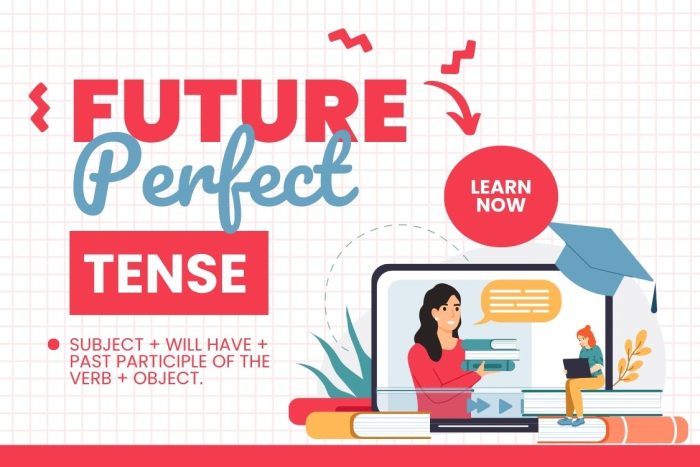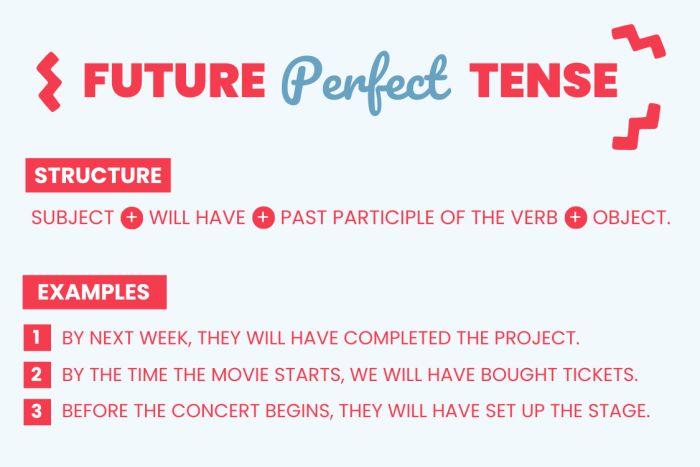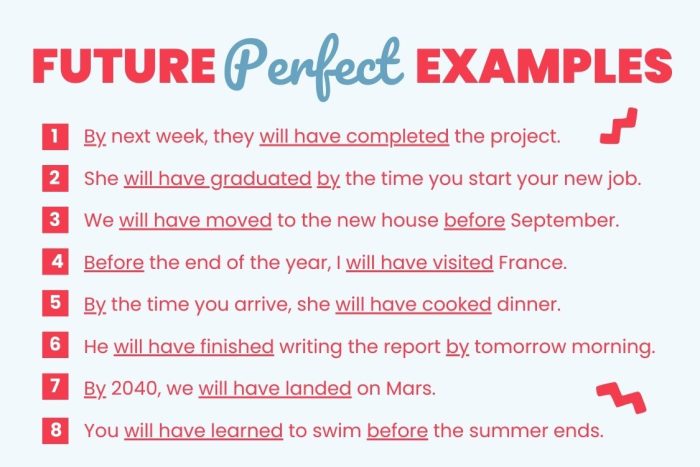Future Perfect Tense

How to Form the Future Perfect Tense
We form the future perfect tense with “will have” followed by the past participle of a verb. The sentence starts with a subject. Then, it ends with an object.
The structure of the future perfect tense is:
Subject + will have + past participle + ___.
Subject + will not have + past participle + ___.
Will + subject + have + past participle + ___?
Here are some examples using the future perfect tense with regular verbs:
- By 9 PM, I will have cooked dinner.
- She will have finished her book by tomorrow morning.
- They will have cleaned the house by the weekend.
- We will have started a new project by next Monday.
- He will have painted the fence by Tuesday.
- By the end of the month, you will have saved enough money.
Here are some examples of using irregular verbs with the future perfect tense:
- By next year, I will have gone to Japan.
- She will have taken the exam by noon.
- They will have seen the new movie by tonight.
- We will have written all the reports by the deadline.
- He will have driven across the country by July.
- By the time you arrive, I will have slept for 8 hours.
These sentences show how the future perfect tense gives us a peek into the future. That means it’s perfect for showing tasks as complete before they’ve even happened.

Future Perfect vs Simple Future
Mixing up the perfect future with simple future tense can happen quite a bit in everyday conversation. This is especially true because both relate to future actions.
Here’s how to differentiate between the two tenses and avoid common mistakes. This is an example of future perfect tense.
Future Perfect – We use future perfect for actions that will be completed before a certain future event.
Structure – Subject + will have + past participle + object.
Example – “By 2030, I will have graduated from college.”
Now, let’s compare this to simple future tense.
Simple Future – This tense talks about general future actions without specifying when they will be completed.
Structure – Subject + will + base form of the verb + object.
Example – “I will graduate.”
Use the simple future tense when talking about a future action without specifying when it will be finished. On the other hand, use the future perfect tense when there is an action that will be finished by a certain time.
When To Use Future Perfect Tense
Remember that we use the future perfect tense for actions that will be finished before a specific time in the future.
Here are three uses for the future perfect tense:
- It’s for actions that will be done before another future moment.
- This tense helps us show that something will be completed by a certain deadline.
- It sets a clear endpoint for future activities.
Keywords that often signal the use of the future perfect tense are “by,” “before,” and “by the time.” Here are some examples.
- By next week, they will have completed the project.
- We will have moved to the new house before September.
- Before the end of the year, I will have visited France.
- By the time you arrive, she will have cooked dinner.
- He will have finished writing the report by tomorrow morning.
Negative and Question Form
How about the negative form? How does this work with the future perfect tense? Here are some examples:
- I will not have finished my project by the deadline.
- She will not have arrived by 8 PM.
- We will not have completed the report by next Friday.
- They will not have learned all the necessary skills by the end of the year.
- You will not have read all the books on the list by summer.
Now, what about the question form for the future perfect tense? Let’s take a look at some examples below.
- Will I have finished my project by the deadline?
- Will she have arrived by 8 PM?
- Will we have completed the report by next Friday?
- Will they have learned all the necessary skills by the end of the year?
- Will you have read all the books on the list by summer?
These sentences show how the future perfect tense gives us a way to talk about completing future tasks by a specific time. I’ve underlined the keywords that signal the future perfect tense.

Usage of Future Perfect Tense
The future perfect tense is one of the 12 verb tenses. It gives us a way to talk about actions that will be completed before a certain point in the future. It helps us set clear expectations about what lies ahead.
Do you have any questions about future perfect tense? We’d love to hear from you. Ask any questions in the comment section below and we’ll be happy to get back to you.
